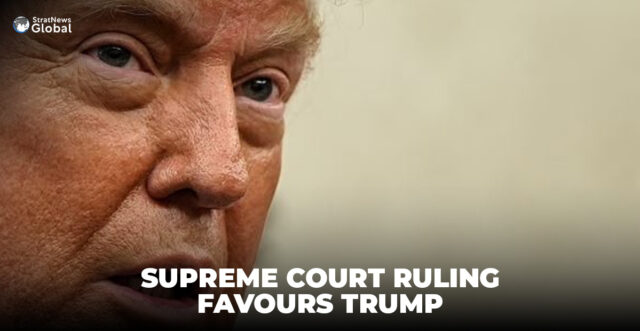The U.S. Supreme Court ruled to limit the power of federal judges to block government policies across the country, giving President Donald Trump a major win. But the ruling may not help him enforce his plan to end birthright citizenship, which is still facing legal challenges.
An executive order that the Republican president signed on his first day back in office in January would restrict birthright citizenship – a far-reaching plan that three federal judges, questioning its constitutionality, quickly halted nationwide through so-called “universal” injunctions.
But the Supreme Court’s ruling on Friday, while announcing a dramatic shift in how judges have operated for years deploying such relief, left enough room for the challengers to Trump’s directive to try to prevent it from taking effect while litigation over its legality plays out.
“I do not expect the president’s executive order on birthright citizenship will ever go into effect,” said Samuel Bray, a Notre Dame Law School professor and a prominent critic of universal injunctions whose work the court’s majority cited extensively in Friday’s ruling.
Trump’s executive order directs federal agencies to refuse to recognize the citizenship of children born in the United States who do not have at least one parent who is an American citizen or lawful permanent resident, also called a “green card” holder.
The three judges found that the order likely violates citizenship language in the U.S. Constitution’s 14th Amendment.
The directive remains blocked while lower courts reconsider the scope of their injunctions, and the Supreme Court said it cannot take effect for 30 days, a window that gives the challengers time to seek further protection from those courts.
The court’s six conservative justices delivered the majority ruling, granting Trump’s request to narrow the injunctions issued by the judges in Maryland, Washington and Massachusetts. Its three liberal members dissented.
The ruling by Justice Amy Coney Barrett, who Trump appointed to the court in 2020, emphasized the need to hem in the power of judges, warning against an “imperial” judiciary. Judges can provide “complete relief” only to the plaintiffs before them, Barrett wrote.
A Host Of Policies
That outcome was a major victory for Trump and his allies, who have repeatedly denounced judges who have impeded his agenda. It could make it easier for the administration to implement his policies, including to accelerate deportations of migrants, restrict transgender rights, curtail diversity and inclusion efforts, and downsize the federal government – many of which have tested the limits of executive power.
In the birthright citizenship dispute, the ruling left open the potential for individual plaintiffs to seek relief beyond themselves through class action lawsuits targeting a policy that would upend the long-held understanding that the Constitution confers citizenship on virtually anyone born on U.S. soil.
Bray said he expects a surge of new class action cases, resulting in “class-protective” injunctions.
“Given that the birthright-citizenship executive order is unconstitutional, I expect courts will grant those preliminary injunctions, and they will be affirmed on appeal,” Bray said.
Some of the challengers have already taken that path. Plaintiffs in the Maryland case, including expectant mothers and immigrant advocacy groups, asked the presiding judge who had issued a universal injunction to treat the case as a class action to protect all children who would be ineligible for birthright citizenship if the executive order takes effect.
“I think in terms of the scope of the relief that we’ll ultimately get, there is no difference,” said William Powell, one of the lawyers for the Maryland plaintiffs. “We’re going to be able to get protection through the class action for everyone in the country whose baby could potentially be covered by the executive order, assuming we succeed.”
The ruling also sidestepped a key question over whether states that bring lawsuits might need an injunction that applies beyond their borders to address their alleged harms, directing lower courts to answer it first.
States Challenge Directive
The challenge to Trump’s directive also included 22 states, most of them Democratic-governed, who argued that the financial and administrative burdens they would face required a nationwide block on Trump’s order.
George Mason University constitutional law expert Ilya Somin said the practical consequences of the ruling will depend on various issues not decided so far by the Supreme Court.
“As the majority recognizes, states may be entitled to much broader relief than individuals or private groups,” Somin said.
New Jersey Attorney General Matthew Platkin, a Democrat who helped lead the case brought in Massachusetts, disagreed with the ruling but sketched out a path forward on Friday. The ruling, Platkin said in a statement, “recognized that nationwide orders can be appropriate to protect the plaintiffs themselves from harm – which is true, and has always been true, in our case.”
Platkin committed to “keep challenging President Trump’s flagrantly unlawful order, which strips American babies of citizenship for the first time since the Civil War” of 1861-1865.
Legal experts said they expect a lot of legal maneuvering in lower courts in the weeks ahead, and the challengers still face an uphill battle.
Compared to injunctions in individual cases, class actions are often harder to successfully mount. States, too, still do not know whether they have the requisite legal entitlement to sue. Trump’s administration said they do not, but the court left that debate unresolved.
Meanwhile, the 30-day clock is ticking. If the challengers are unsuccessful going forward, Trump’s order could apply in some parts of the country, but not others.
“The ruling is set to go into effect 30 days from now and leaves families in states across the country in deep uncertainty about whether their children will be born as U.S. citizens,” said Elora Mukherjee, director of Columbia Law School’s immigrants’ rights clinic.
(With inputs from Reuters)





